
Pew Research Center conducted this study to understand Americans’ attitudes about the recent demonstrations following George Floyd’s death and race relations in this country, as well as personal experiences with racial discrimination and activism on issues related to race or racial equality. For this analysis, we surveyed 9,654 U.S. adults on June 4-10, 2020. Everyone who took part is a member of Pew Research Center’s American Trends Panel (ATP), an online survey panel that is recruited through national, random sampling of residential addresses. This way, nearly all U.S. adults have a chance of selection. The survey is weighted to be representative of the U.S. adult population by gender, race, ethnicity, partisan affiliation, education and other categories. Read more about the ATP’s methodology.
See here to read more about the questions used for this report and the report’s methodology.
 As demonstrations continue across the country to protest the death of George Floyd, a black man killed while in Minneapolis police custody, Americans see the protests both as a reaction to Floyd’s death and an expression of frustration over longstanding issues. Most adults say tensions between black people and police and concerns about the treatment of black people in the U.S. – in addition to anger over Floyd’s death – have contributed a great deal to the protests, according to a new Pew Research Center survey.
As demonstrations continue across the country to protest the death of George Floyd, a black man killed while in Minneapolis police custody, Americans see the protests both as a reaction to Floyd’s death and an expression of frustration over longstanding issues. Most adults say tensions between black people and police and concerns about the treatment of black people in the U.S. – in addition to anger over Floyd’s death – have contributed a great deal to the protests, according to a new Pew Research Center survey.
About six-in-ten U.S. adults say some people taking advantage of the situation to engage in criminal behavior has also been a major contributing factor in the protests. There are wide partisan gaps in these views. While roughly eight-in-ten Republicans and those who lean Republican say people taking advantage to engage in criminal behavior has been a major factor, only about four-in-ten Democrats and Democratic leaners agree. Democrats are much more likely than Republicans to say protesters have been motivated by longstanding concerns about the treatment of black people.
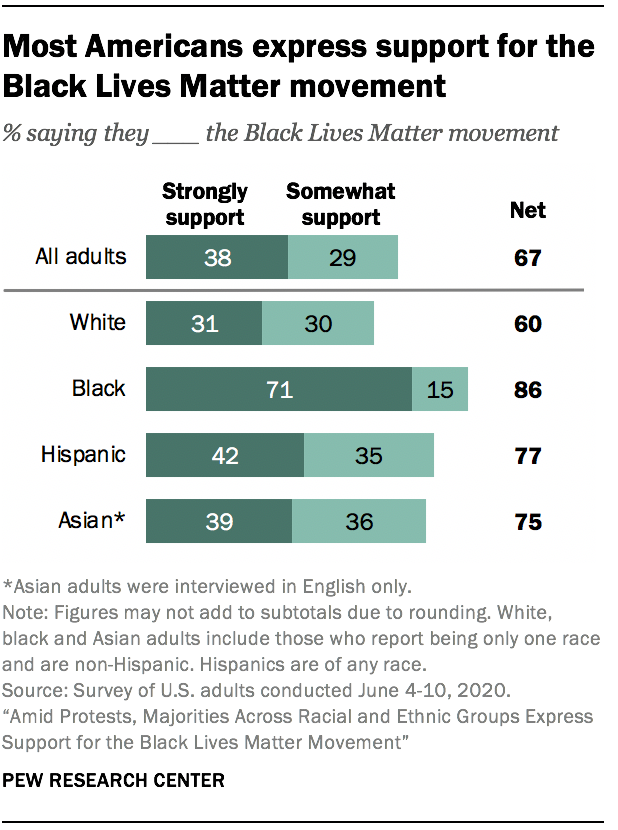 The Black Lives Matter movement, which is back in the headlines amid the nationwide protests, receives wide support. Two-thirds of U.S. adults say they support the movement, with 38% saying they strongly support it. This sentiment is particularly strong among black Americans, although majorities of white (60%), Hispanic (77%) and Asian (75%) Americans express at least some support.1
The Black Lives Matter movement, which is back in the headlines amid the nationwide protests, receives wide support. Two-thirds of U.S. adults say they support the movement, with 38% saying they strongly support it. This sentiment is particularly strong among black Americans, although majorities of white (60%), Hispanic (77%) and Asian (75%) Americans express at least some support.1
President Donald Trump receives negative marks for his handling of the demonstrations to protest the death of George Floyd. Six-in-ten Americans say the president has been delivering the wrong message to the country in response to these protests. Asked about Trump’s handling of race relations more generally, about half (48%) say he has made race relations worse; 19% say he has made progress toward improving race relations, 19% say he has tried but failed to make progress and 12% say the president hasn’t addressed the issue.
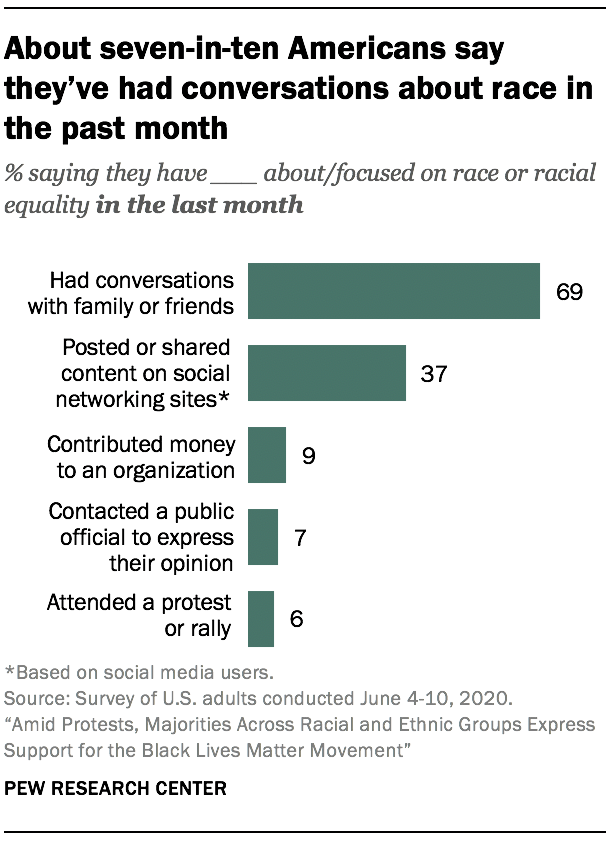 Americans are talking to family and friends about race and racial equality: 69%, including majorities across racial and ethnic groups, say they have done so in the last month. And 37% of those who use social networking sites say they have posted or shared content related to race or racial equality on these sites during this period. Smaller shares say they have contributed money to a group or organization that focuses on race or racial equality (9%), contacted a public official to express their opinion on these issues (7%), or attended a rally or protest focused on these issues (6%) in the last month. About one-in-ten among black (10%), Hispanic (9%) and Asian (10%) adults say they have attended a protest, compared with 5% of white adults.
Americans are talking to family and friends about race and racial equality: 69%, including majorities across racial and ethnic groups, say they have done so in the last month. And 37% of those who use social networking sites say they have posted or shared content related to race or racial equality on these sites during this period. Smaller shares say they have contributed money to a group or organization that focuses on race or racial equality (9%), contacted a public official to express their opinion on these issues (7%), or attended a rally or protest focused on these issues (6%) in the last month. About one-in-ten among black (10%), Hispanic (9%) and Asian (10%) adults say they have attended a protest, compared with 5% of white adults.
A majority of Americans (55%) see protests and rallies as a very or somewhat effective tactic for groups and organizations that work to help black people achieve equality, but just 19% say this is a very effective tool. More say working directly with black people to solve problems in their local communities (82%), bringing people of different racial backgrounds together to talk about race (74%), and working to get more black people elected to office (68%) would be at least somewhat effective tactics.
The survey also finds that 45% of black Americans say they have been unfairly stopped by police because of their race or ethnicity. Smaller shares of Hispanic (19%), Asian (16%) and white (9%) Americans say this has happened to them. Black men (64%) are far more likely than black women (32%) to say they have been unfairly stopped by police. Still, black women are more likely than white or Hispanic women to say they’ve had this experience.
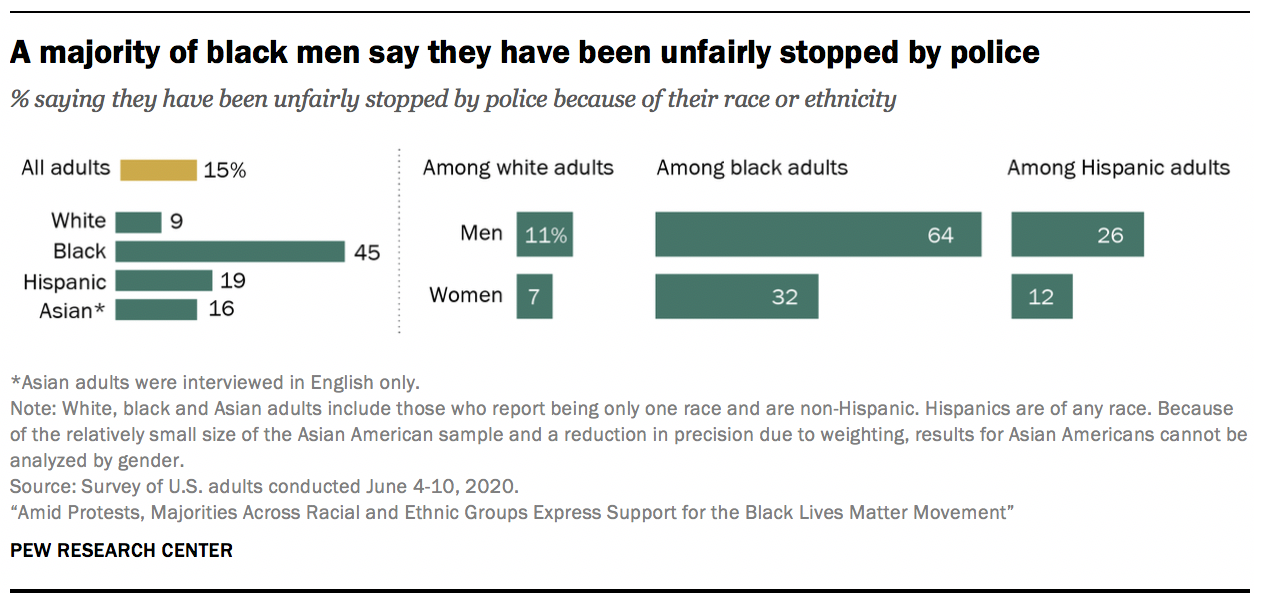
These are among the findings of a Pew Research Center survey of 9,654 U.S. adults conducted June 4-10, 2020, using the Center’s American Trends Panel, in conjunction with the Center’s American News Pathways project.2
Across racial and ethnic groups, Americans say both anger over Floyd’s death and broader racial issues contributed to protests
In thinking about the demonstrations that have taken place around the country to protest the death of George Floyd, the public sees a mix of contributing factors. Seven-in-ten say anger over Floyd’s death after his arrest by police has contributed a great deal to the protests, but roughly the same share (69%) point to broader tensions between black people and police. And nearly as many (65%) say the protesters are motivated by longstanding concerns about the treatment of black people in the country. A smaller share – but still a majority (59%) – say some people’s desire to take advantage of the situation to engage in criminal behavior has contributed a great deal to the protests.
Black and white adults differ somewhat in their assessment of the underlying motivations of the protesters, but the racial differences pale in comparison to the partisan gaps. Similar shares of black adults point to longstanding concerns about the treatment of black people and anger over George Floyd’s death as major factors underlying the protests (83% and 81%, respectively, say each of these factors contributed a great deal). In addition, 76% of black adults say tensions between black people and the police have contributed a great deal to the protests.
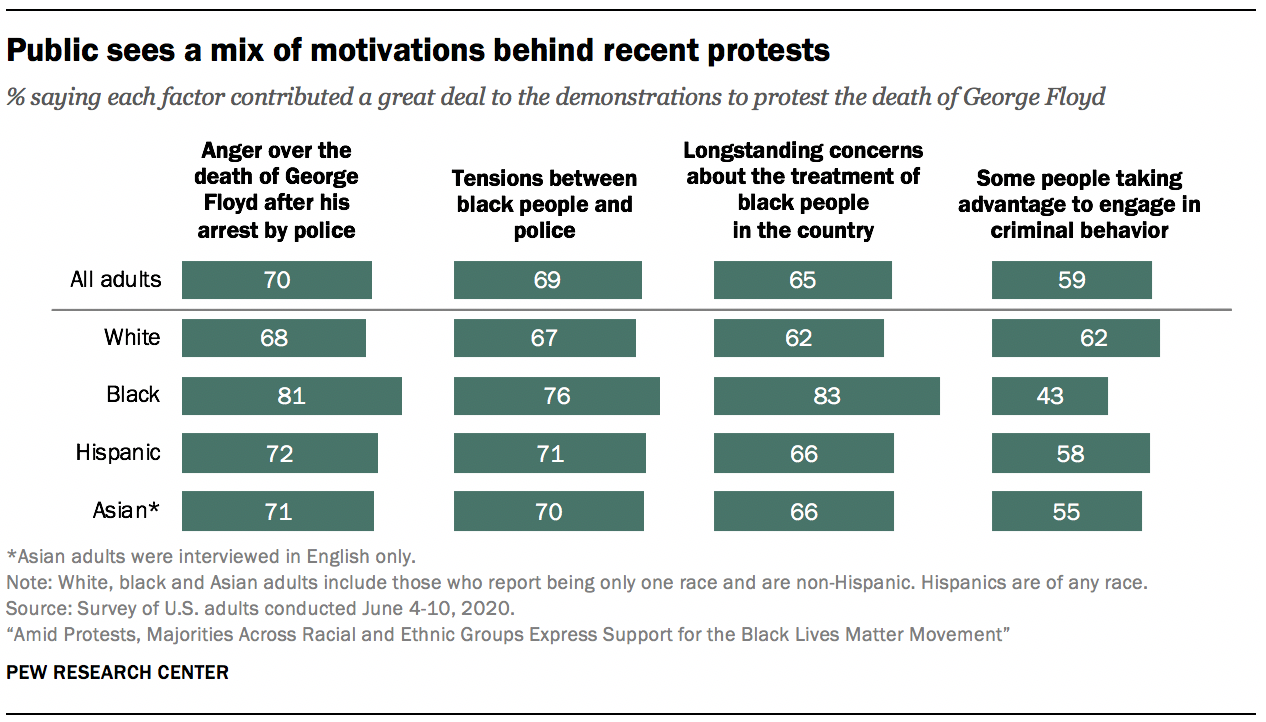
White adults are less likely than black adults to see each of these as major contributors to the protests. About six-in-ten white adults (62%) say longstanding concerns about the treatment of black people in the U.S. has contributed a great deal, and roughly two thirds say the same about anger over the Floyd’s death (68%) and tensions between black people and the police (67%).
When it comes to some people taking advantage of the situation to engage in criminal behavior, fewer than half of black adults (43%) say this has contributed a great deal to the protests. By contrast, 62% of white adults see this as contributing a great deal. The views of Hispanic and Asian adults are more in line with those of white adults on this issue: 58% of Hispanic and 55% of Asian adults say this factor contributed a great deal to the protest.
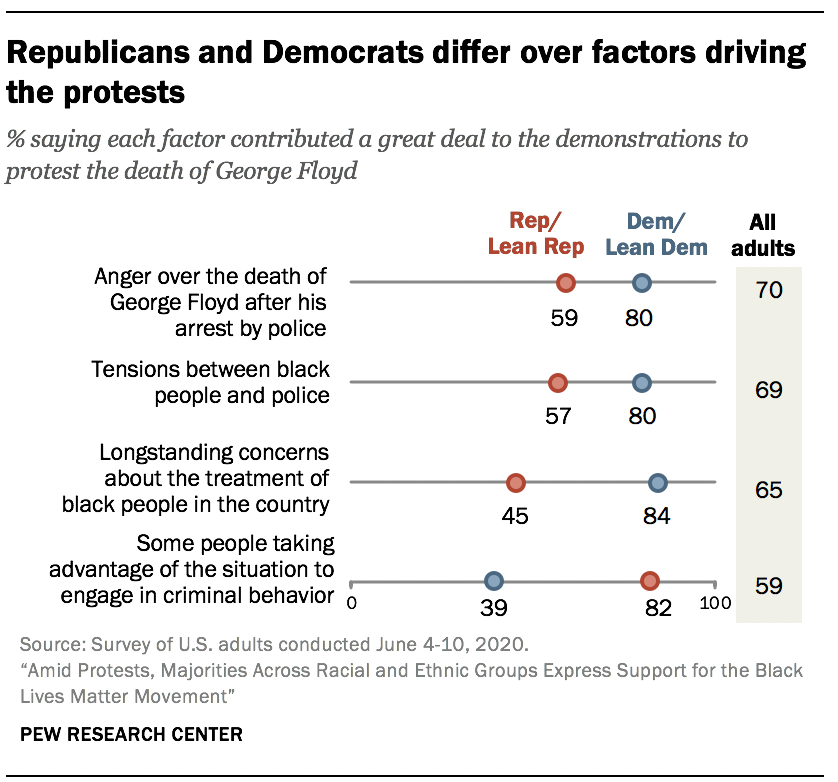 Republicans and Democrats have vastly different views on the factors underlying the protests. Eight-in-ten Democrats and those who lean to the Democratic Party say anger over Floyd’s death after his arrest by police and tensions between black people and the police have each contributed a great deal to the protests. Much smaller majorities of Republicans and Republican leaners say the same (59% say anger over Floyd’s death has contributed a great deal, 57% say the same about tensions between police and black people).
Republicans and Democrats have vastly different views on the factors underlying the protests. Eight-in-ten Democrats and those who lean to the Democratic Party say anger over Floyd’s death after his arrest by police and tensions between black people and the police have each contributed a great deal to the protests. Much smaller majorities of Republicans and Republican leaners say the same (59% say anger over Floyd’s death has contributed a great deal, 57% say the same about tensions between police and black people).
The gap is even wider when it comes to longstanding concerns about the treatment of black people in the country. While 84% of Democrats say these concerns have contributed a great deal to the protests, only 45% of Republicans say the same. White and black Democrats are largely in agreement about the extent to which each of these factors has contributed to the protests.
Republicans are much more likely than Democrats to say some people taking advantage of the situation in order to engage in criminal behavior has contributed a great deal to the protests. Some 82% of Republicans express this view, compared with 39% of Democrats. On this issue, there is a significant difference between white and black Democrats. Black Democrats are more likely than their white counterparts to say that the protests were motivated in part by people taking advantage of the situation to engage in criminal behavior – 42% of black Democrats compared with 34% of white Democrats say this contributed a great deal.
About two-thirds of black adults say Trump has made race relations worse
Views on the effect Donald Trump has had on race relations in the U.S. remain negative on balance. About half of adults (48%) say Trump has made race relations worse. Roughly one-in-five (19%) say he has made progress toward improving race relations, while an identical share (19%), say he’s tried but failed to make progress. Some (12%) say Trump hasn’t addressed the issue.
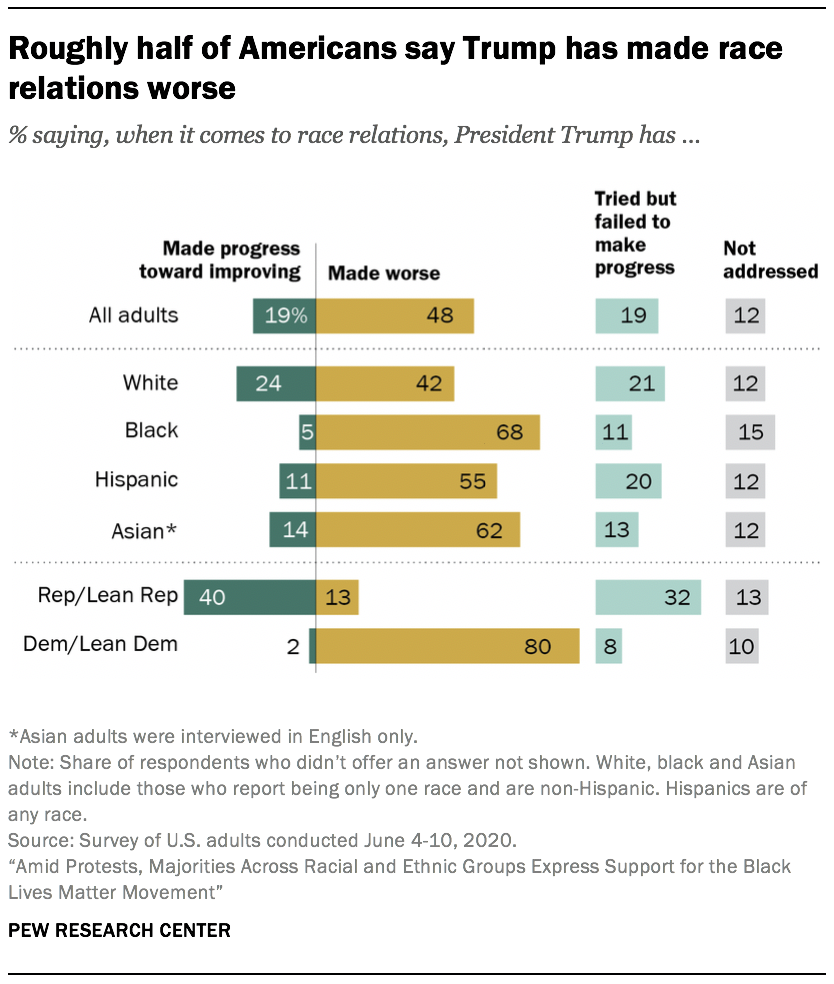 The share saying Trump has made race relations worse is down from 56% in 2019. At the same time, the share saying he has made progress has ticked up (from 15% to 19%), as has the share saying he has tried but failed to make progress (from 13% to 19%).
The share saying Trump has made race relations worse is down from 56% in 2019. At the same time, the share saying he has made progress has ticked up (from 15% to 19%), as has the share saying he has tried but failed to make progress (from 13% to 19%).
Similar to 2019, there are deep racial and partisan divides in views about Trump’s impact on race relations. Black, Asian and Hispanic adults are more likely than whites to say that Trump has made race relations worse. Roughly two-thirds of black adults (68%), 62% of Asian adults and 55% of Hispanic adults express this view, compared with 42% of white adults.
Among white adults, roughly a quarter (24%) say Trump has made progress toward improving race relations. Only 5% of black adults agree with this assessment, as do 11% of Hispanic and 14% of Asian adults.
Republicans and Democrats differ widely in their views on the effect Trump has had on race relations. Four-in-ten Republicans say Trump has made things better, while only 13% say he has made things worse. About a third of Republicans (32%) say Trump has tried but failed to make progress and 13% say he hasn’t addressed the issue. By contrast, 80% of Democrats say Trump has made race relations worse, only 2% say he’s made things better, 8% say he’s tried and failed, and 10% say he hasn’t addressed the issue.
Public sees working with black people in their local communities as more effective than protests and other tactics for achieving equality
Overall, majorities of Americans see working directly with black people to solve problems in their local communities (82%), bringing people of different racial backgrounds together to talk about race (74%), and working to get more black people elected to office (68%) as effective tactics for groups and organizations that work to help black people achieve equality. Smaller shares – though still more than half (55%) – believe organizing protests and rallies are an effective tool for achieving equality.
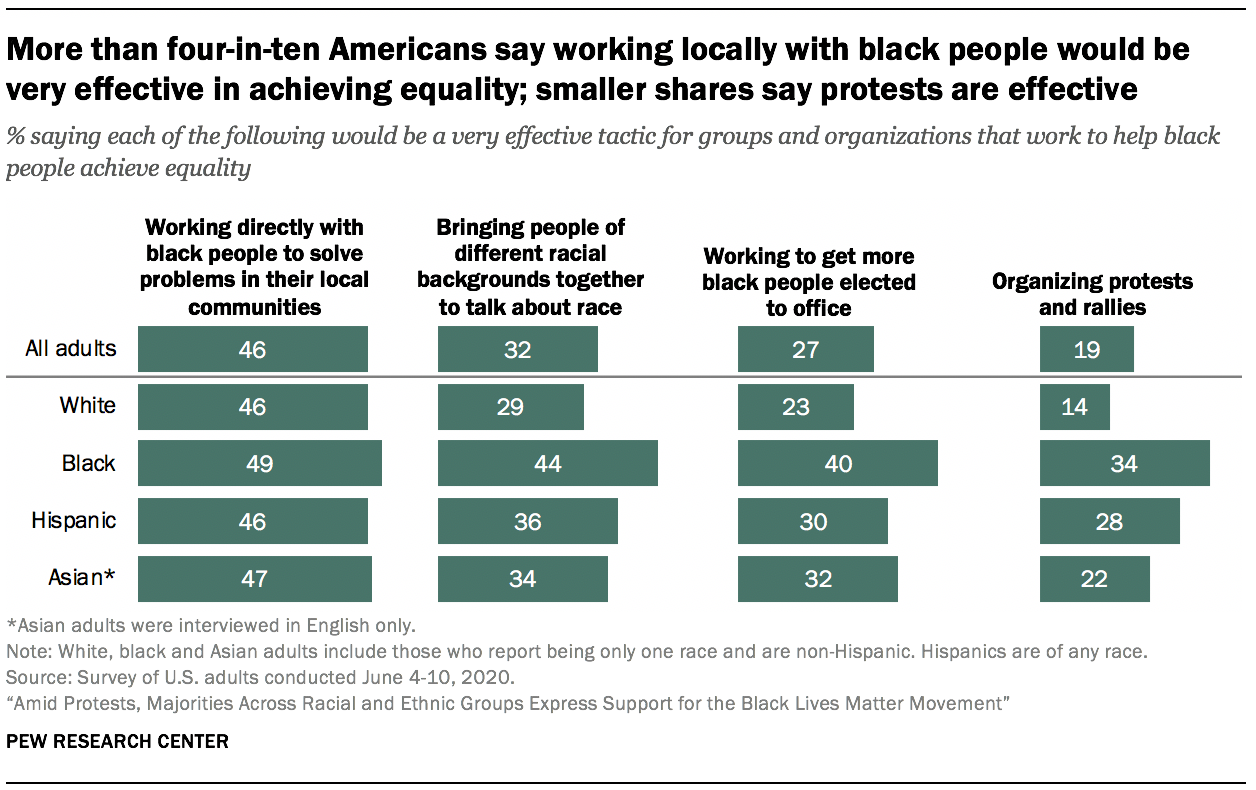
There are differences in the degree to which people believe these tactics can be effective. Fully 46% of Americans say it would be very effective for groups and organizations working to help black people achieve equality to work directly with black people to solve problems in their local communities, while smaller shares consider bringing people of different racial backgrounds together to talk about race (32%), working to get more black people elected to office (27%), and organizing protests and rallies (19%) as very effective. (This pattern is somewhat similar to those found in the Center’s 2016 telephone survey, which found that community-based methods of achieving equality were viewed as more effective than other tactics.)
Similar shares of white, black, Hispanic and Asian Americans agree that working directly with local communities is a very effective strategy for addressing racial inequality, but there are racial and ethnic differences when it comes to other tactics measured in the survey.
Black Americans stand out from other racial and ethnic groups in seeing organizing protests and rallies as an effective tactic. Roughly one-third of black adults (34%) say that this is a very effective way to help black people achieve equality, compared with 14% of white Americans. Views among Hispanic and Asian Americans fall between the two groups, at 28% and 22%, respectively.
When it comes to bringing people of different racial backgrounds together, black adults (44%) are also more likely than Hispanic (36%), Asian (34%) or white adults (29%) to describe this as a particularly effective strategy for helping black people achieve equality.
White Americans (23%) are less likely than their black (40%), Asian (32%) and Hispanic counterparts (30%) to believe getting more black people elected to office is a very effective tactic for addressing inequality.
Democrats are far more likely than Republicans to see getting black people elected to office as a very effective way to bring about racial equality
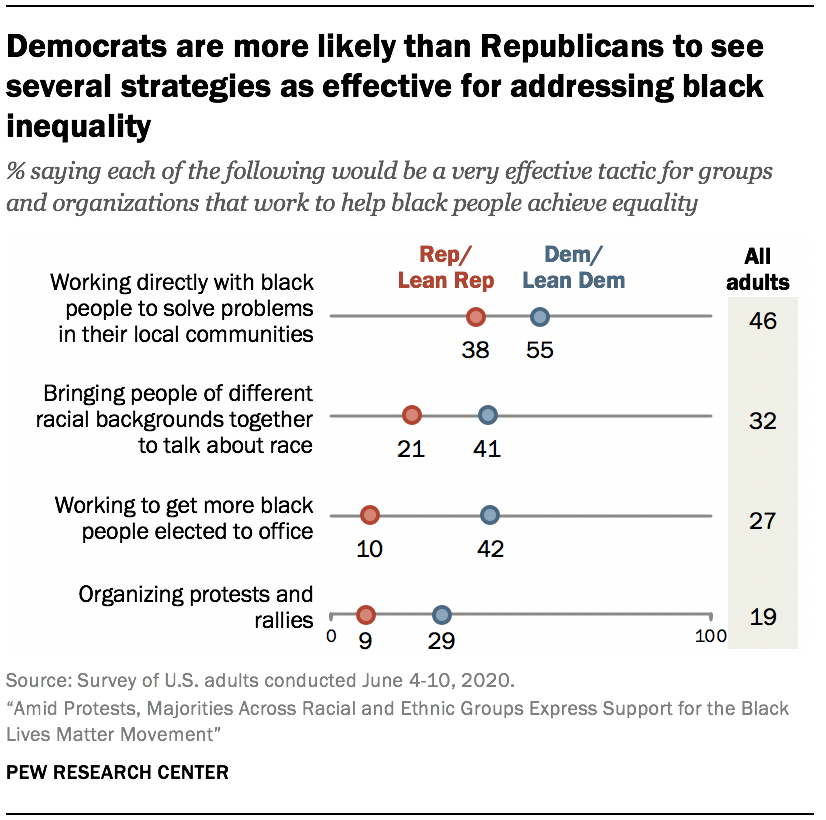 Democrats are more likely than Republicans to say a variety of tactics used by groups and organizations that work to help black people achieve equality would be particularly effective for combating racial inequality.
Democrats are more likely than Republicans to say a variety of tactics used by groups and organizations that work to help black people achieve equality would be particularly effective for combating racial inequality.
This partisan gap is widest when looking at views about electing more black people to political offices. Roughly four-in-ten Democrats and Democratic leaners (42%) say that working to get more black people elected to office is a very effective tactic to help black people achieve equality. Just 10% of Republicans and Republican leaners say the same.
Democrats are also more likely than Republicans to see organizing protests, bringing people of different racial backgrounds together to talk about race, and working directly with black people to solve problems in their local communities as particularly effective strategies.
On the other hand, many Republicans view these tactics as ineffective. For example, 67% of Republicans and Republican leaners say organizing protests and rallies are not too or not at all effective in bringing about equality, while 49% believe this to be true about getting more black people elected office. For Democrats and Democratic leaners, those shares are 23% and 14%, respectively.
A majority of Americans support the Black Lives Matter movement
In the wake of recent incidents in which black Americans have been killed by police, the Black Lives Matter movement— and the hashtag of the same name – is back in the national spotlight. This survey finds that a majority of Americans are supportive of Black Lives Matter, but Republicans and Democrats hold dramatically different views about the movement.
 Overall, 67% of Americans say they strongly (38%) or somewhat (29%) support the Black Lives Matter movement, while smaller shares (31%) oppose the movement.3
Overall, 67% of Americans say they strongly (38%) or somewhat (29%) support the Black Lives Matter movement, while smaller shares (31%) oppose the movement.3
Across racial and ethnic groups, people are more likely to support rather than oppose Black Lives Matter. The strength of that support is highest among black Americans. Fully 86% say they are at least somewhat supportive of Black Lives Matter, including 71% who offer strong support.
At the same time, large shares of Hispanic (77%), Asian (75%) and white (60%) adults also say they at least somewhat support the Black Lives Matter movement. Still, only about four-in-ten or less of each of these groups express strong support.
Political divides are even more striking than racial ones. Fully 91% of Democrats and Democratic leaners say they support the movement, compared with 40% of Republicans and Republican leaners.
Similar partisan gaps are present when looking only among the white population. White Democrats are 55 percentage points more likely than white Republicans to express some level of support for Black Lives Matter (92% vs. 37%). The gap is just as wide when it comes to the shares who are especially supportive: 62% of white Democrats offer strong support, compared with just 7% of white Republicans.
Most Americans say they’ve had conversations about race or racial equality in the last month
About seven-in-ten Americans (69%) say they have had conversations with family or friends about issues related to race or racial equality in the last month. Another 13% say they have done this, but not in the last month. Majorities of white (70%), black (75%), Hispanic (61%) and Asian (64%) adults say they’ve had these conversations in the last month.
Some 37% of adults who use social networking sites say they have posted or shared content on those sites related to race or racial equality in the last month. Smaller shares of all U.S. adults say they have contributed money to an organization that focuses on these issues (9%), contacted a public official to express their opinion on race or racial equality (7%), or attended a protest or rally that focused on these issues (6%) in the last month. The shares who say they have ever done each of these range from 15% who say they have attended a rally or protest that focused on race or racial equality to 46% who say they have posted or shared content about these topics on social networking sites (among those who use these sites).
About one-in-ten black (10%), Hispanic (9%) and Asian (10%) adults say they have attended a rally or protest focused on race or racial equality in the last month; 5% of white adults say the same. The survey did not specifically ask if respondents attended a protest or rally related to George Floyd’s death. Black, Hispanic and Asian adults are also more likely than white adults to say they have contributed money to a group or organization that focuses on race or racial equality. Asian Americans are particularly likely to say they have given money to such an organization: 21% say they have done so in the last month, compared with 13% of Black Americans, 11% of Hispanic Americans and 7% of white Americans.
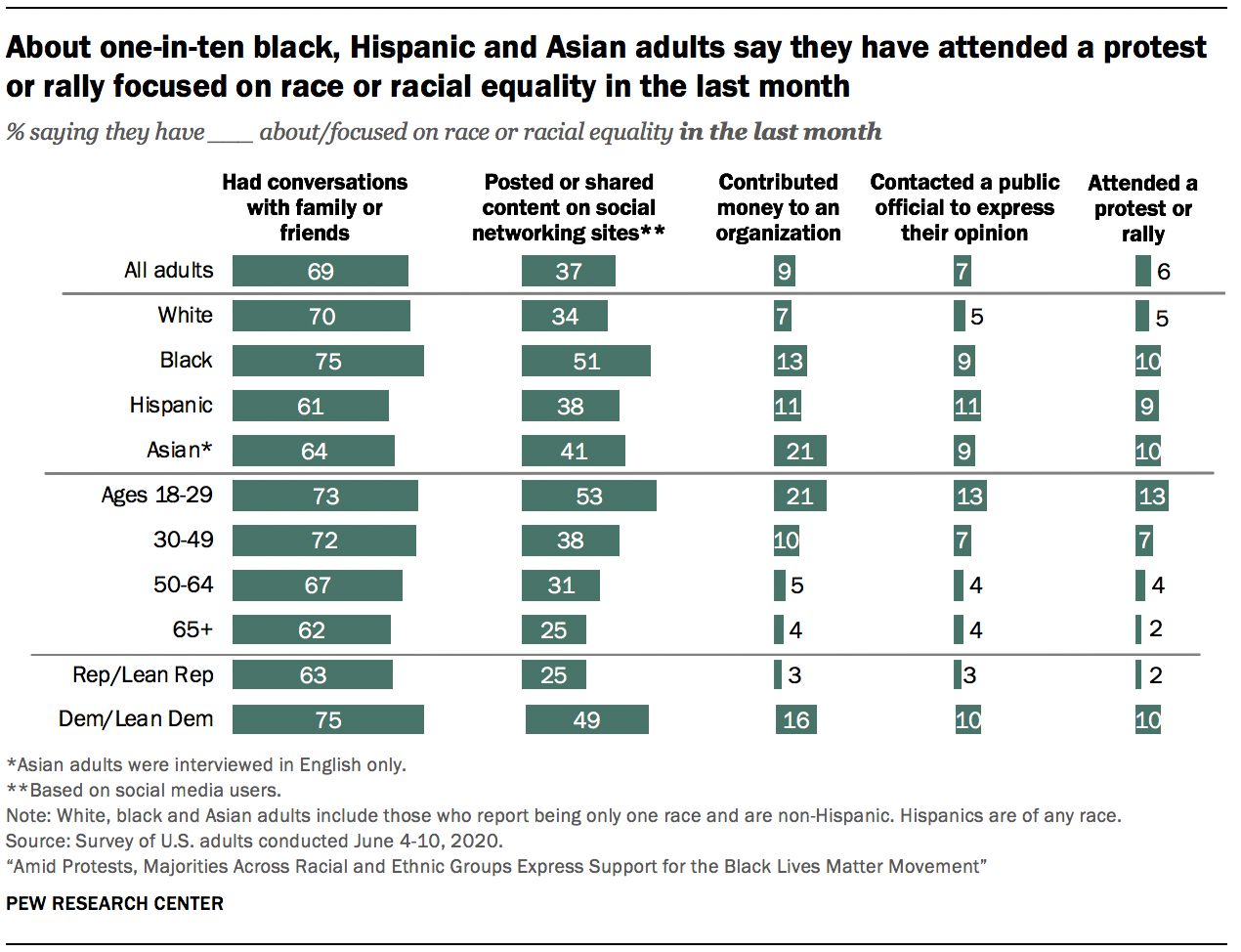
Roughly half of black adults who use social networking sites (51%) say they have posted or shared content related to race or racial equality in the last month, higher than the shares of white (34%) and Hispanic (38%) social media users who say they have done the same. Some 41% of Asian social media users also say they have posted or shared content related to these issues.
With the exception of having conversations with family and friends, adults younger than 30 are more likely than older adults to have done each of the activities asked about in the survey. For example, younger adults are three times as likely as those ages 30 or older to say they’ve contributed money to an organization that focuses on race or racial equality in the last month (21% vs. 7%).
There are particularly notable age differences in the shares of younger and older Hispanic adults who say they have attended a protest or rally focused on race or racial equality in the last month: 18% of Hispanics ages 18 to 29 say they have done this, compared with 4% of those ages 30 to 49 and 3% of those 50 and older.
The survey also finds wide partisan gaps in these measures of activism, with Democrats and those who lean Democratic more likely than Republicans and Republican leaners to say they have done each of these activities in the last month. For example, one-in-ten Democrats say they have contacted a public official to express their opinion on issues of race or racial equality or attended a protest or rally focused on these issues (10% each) in the last month; just 3% of Republicans say they have contacted a public official and 2% say they have attended a protest focused on race or racial equality. And while 16% of Democrats say they have contributed money to a group or organization that focuses on race or racial equality in the last month, just 3% of Republicans say they have done this.
Democrats who use social networking sites are about twice as likely as their Republican counterparts to say they have posted or shared content related to race or racial equality in the last month (49% vs. 25%).
White, black and Hispanic Democrats are about equally likely to say they have contacted a public official, contributed money or attended a protest in the last month. White and black Democrats are more likely than Hispanic Democrats to say they have talked about these issues with family or friends or have posted or shared content about these issues on social networking sites (among those who use these sites).
Most black men say they have been unfairly stopped by police because of their race or ethnicity
Most black (83%), Asian (73%) and Hispanic (65%) Americans say they have experienced discrimination or have been treated unfairly because of their race or ethnicity either regularly or from time to time, but black adults are the most likely to say this has happened to them; 31% of white adults say they have experienced discrimination because of their race or ethnicity.
When it comes to specific situations they may have faced because of their race or ethnicity, black Americans are much more likely than other racial or ethnic groups to say people have acted like they were suspicious of them or that they have feared for their personal safety, been unfairly stopped by police or been treated unfairly when seeking medical treatment. For example, 78% of black adults say people have acted like they were suspicious of them, compared with 46% of Hispanic, 43% of Asian and 20% of white adults. Similar shares of black and Asian Americans say they have been subject to slurs or jokes because of their race or ethnicity.
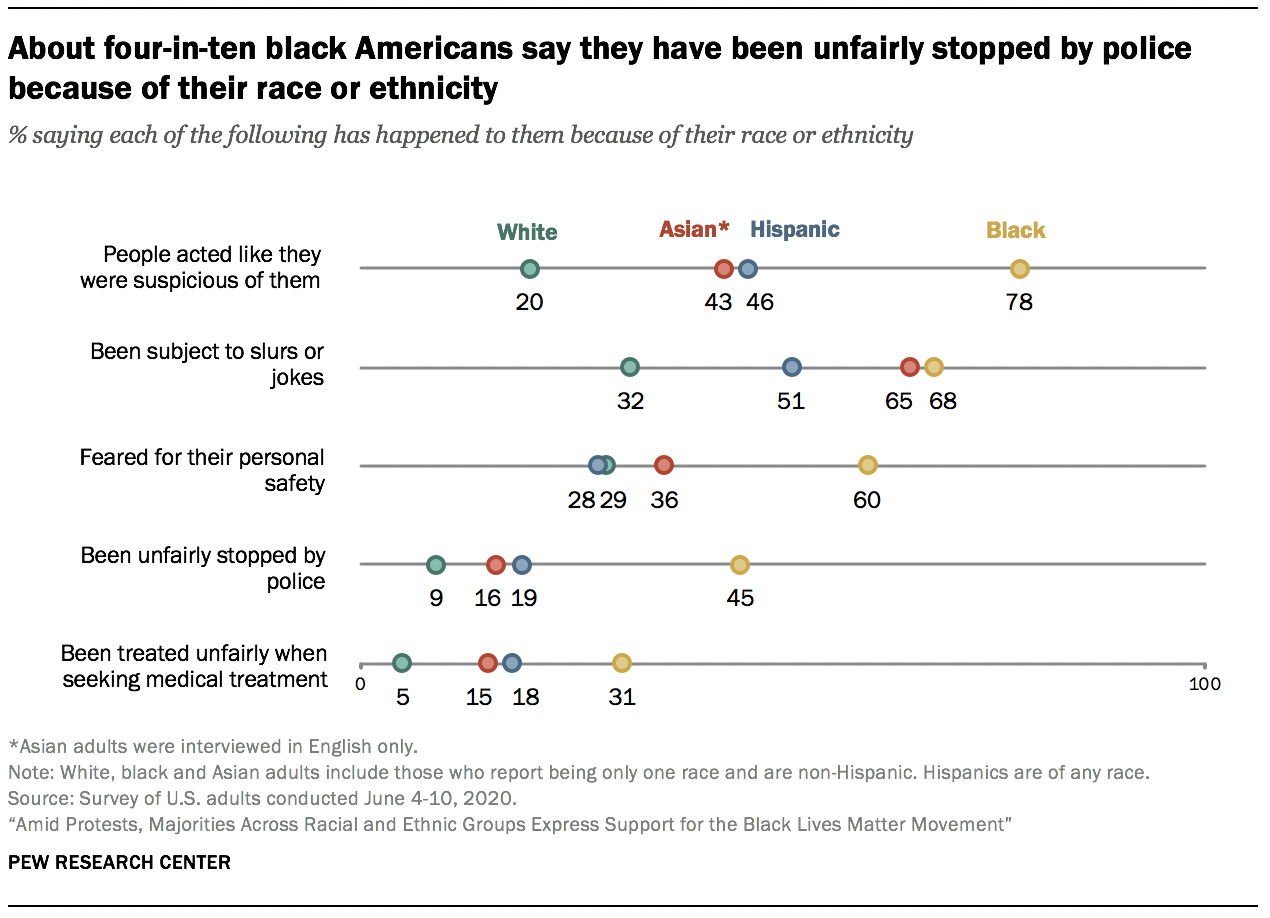
Black men (64%) are far more likely than black women (32%) to say they have been unfairly stopped by police because of their race or ethnicity. White and Hispanic men are also more likely than their female counterparts to say this has happened to them, but gender differences are far less pronounced among white and Hispanics adults (11% of white men vs. 7% of white women and 26% of Hispanic men vs. 12% of Hispanic women say they have experienced this).
Larger shares of black men than women also say they have been subject to slurs or jokes because of their race or ethnicity (76% vs. 62%) or that they feared for their personal safety (67% vs. 56%). There are no significant differences in the shares of black men and women who say people have acted as if they were suspicious of them or who have been treated unfairly when seeking medical treatment.
References to white, black and Asian adults include only those who are non-Hispanic and identify as only one race. Hispanics are of any race.
All references to party affiliation include those who lean toward that party. Republicans include those who identify as Republicans and independents who say they lean toward the Republican Party. Democrats include those who identify as Democrats and independents who say they lean toward the Democratic Party.


